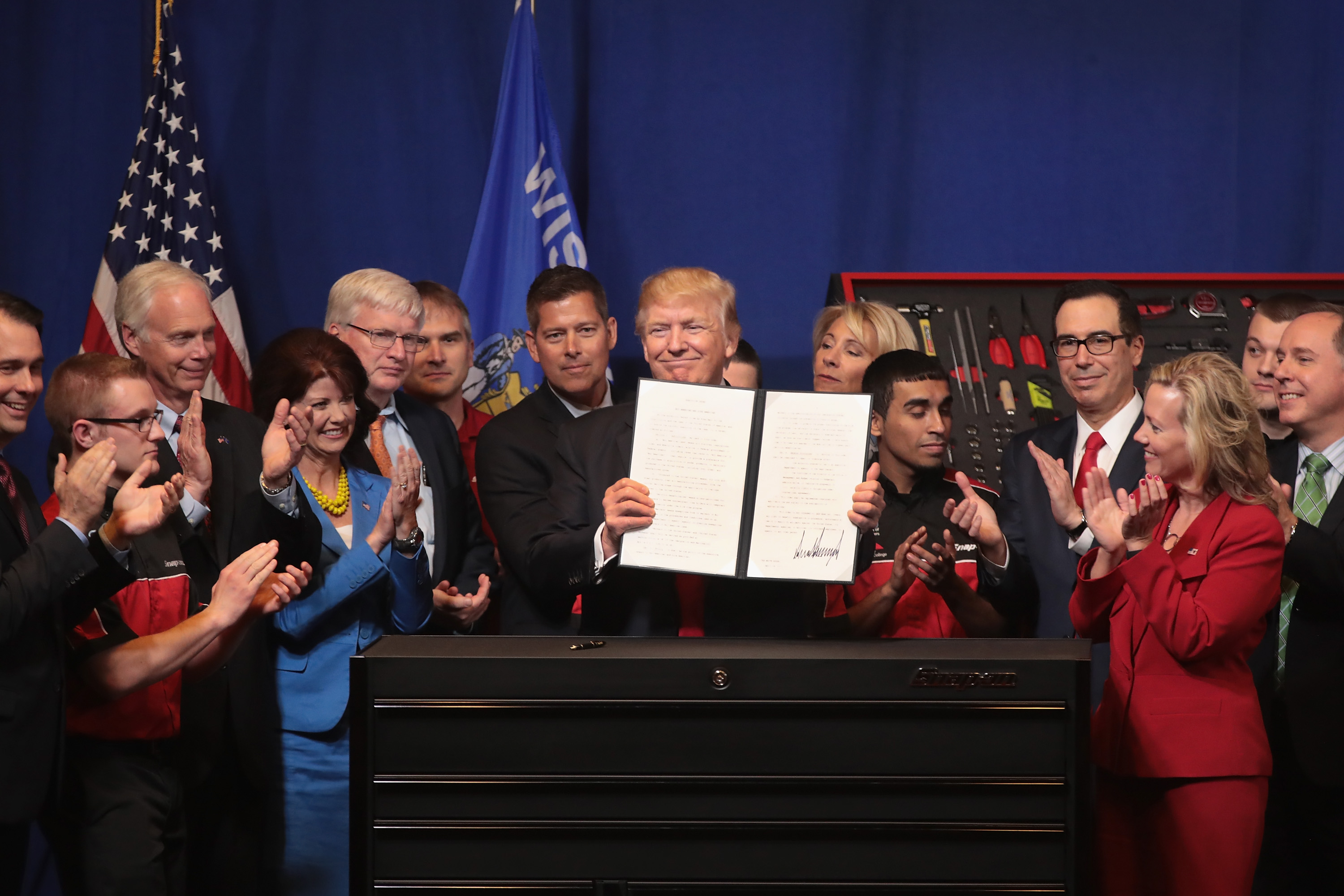The trouble with Trump's 'Buy American' plan
If you opposed the government's bailing out of auto companies that couldn't compete in a global marketplace, why would you support propping up the steel industry?

A free daily email with the biggest news stories of the day – and the best features from TheWeek.com
You are now subscribed
Your newsletter sign-up was successful
The smartest insight and analysis, from all perspectives, rounded up from around the web:
President Trump just took a big step toward delivering on his promises to American workers, said Andy Schlafly at Town Hall. At an event in Wisconsin last week, Trump unveiled an executive order that increases scrutiny of visas for skilled foreign workers and directs federal agencies to favor American companies in awarding contracts. These commonsense moves are long overdue. "If taxpayers are funding a project, then it obviously makes sense to use American goods for it." But "it is not enough to 'Buy American.' It is also important to 'Hire American.'" Too many companies have abused the H-1B visa program by using it to bypass qualified U.S. workers in favor of cheaper foreigners. President Trump gets it: America's best jobs belong to Americans.
I'm old enough to remember when conservatives opposed this kind of anti-capitalist nonsense, said David Harsanyi at The Federalist. "It's hardly abusive for industries to decide whom they want to hire instead of letting government decide for them." H-1B visas are vital for the tech industry, which is already grappling with a shortage of Americans trained in science and engineering. Many foreigners who have come in on H-1Bs have also gone on to found companies here in America, which in turn creates American jobs. As for 'Buy American,' "this is what Republicans used to call 'picking winners and losers.'" If you opposed the government's bailing out of auto companies that couldn't compete in a global marketplace, why would you support propping up the steel industry?
The Week
Escape your echo chamber. Get the facts behind the news, plus analysis from multiple perspectives.

Sign up for The Week's Free Newsletters
From our morning news briefing to a weekly Good News Newsletter, get the best of The Week delivered directly to your inbox.
From our morning news briefing to a weekly Good News Newsletter, get the best of The Week delivered directly to your inbox.
Talk about a recipe for corruption and cronyism, said Kevin Williamson at National Review. U.S. law already requires the government to favor U.S. firms — and has for decades. But "Washington loves a waiver," and exceptions exist for goods that aren't available or cost too much. The rules can also be bypassed if a deal serves "the public interest." That gives a lot of power to politicians, who can steer contracts toward their friends and donors. It's also a good way to cost the government money, said Nicholas Clairmont at The Atlantic. U.S. companies that don't have foreign competition have no reason to innovate or lower their prices. "For an administration that wants to dramatically reduce federal spending, restricting bidders to American firms works directly against" its goal.
Whatever the merits, exhortations to Buy and Hire American are "remarkably hypocritical" coming from Trump, said Philip Bump at The Washington Post. His properties, including Mar-a-Lago and Trump National Golf Club, have applied to fill more than 500 positions with foreign workers since 2013. His branded ties and other apparel are also made overseas. "It's not clear what, if anything, will change" thanks to this order, anyway, said Adam Davidson at the New Yorker. The vague language merely requires the secretary of commerce to provide agencies with "guidance." Meanwhile, the "real problems in the American economy" — stagnant wages and increasing inequality — go unaddressed. Effective economic policy requires more substance, and less theatrics.
A free daily email with the biggest news stories of the day – and the best features from TheWeek.com
-
 The ‘ravenous’ demand for Cornish minerals
The ‘ravenous’ demand for Cornish mineralsUnder the Radar Growing need for critical minerals to power tech has intensified ‘appetite’ for lithium, which could be a ‘huge boon’ for local economy
-
 Why are election experts taking Trump’s midterm threats seriously?
Why are election experts taking Trump’s midterm threats seriously?IN THE SPOTLIGHT As the president muses about polling place deployments and a centralized electoral system aimed at one-party control, lawmakers are taking this administration at its word
-
 ‘Restaurateurs have become millionaires’
‘Restaurateurs have become millionaires’Instant Opinion Opinion, comment and editorials of the day
-
 The pros and cons of noncompete agreements
The pros and cons of noncompete agreementsThe Explainer The FTC wants to ban companies from binding their employees with noncompete agreements. Who would this benefit, and who would it hurt?
-
 What experts are saying about the economy's surprise contraction
What experts are saying about the economy's surprise contractionThe Explainer The sharpest opinions on the debate from around the web
-
 The death of cities was greatly exaggerated
The death of cities was greatly exaggeratedThe Explainer Why the pandemic predictions about urban flight were wrong
-
 The housing crisis is here
The housing crisis is hereThe Explainer As the pandemic takes its toll, renters face eviction even as buyers are bidding higher
-
 How to be an ally to marginalized coworkers
How to be an ally to marginalized coworkersThe Explainer Show up for your colleagues by showing that you see them and their struggles
-
 What the stock market knows
What the stock market knowsThe Explainer Publicly traded companies are going to wallop small businesses
-
 Can the government save small businesses?
Can the government save small businesses?The Explainer Many are fighting for a fair share of the coronavirus rescue package
-
 How the oil crash could turn into a much bigger economic shock
How the oil crash could turn into a much bigger economic shockThe Explainer This could be a huge problem for the entire economy